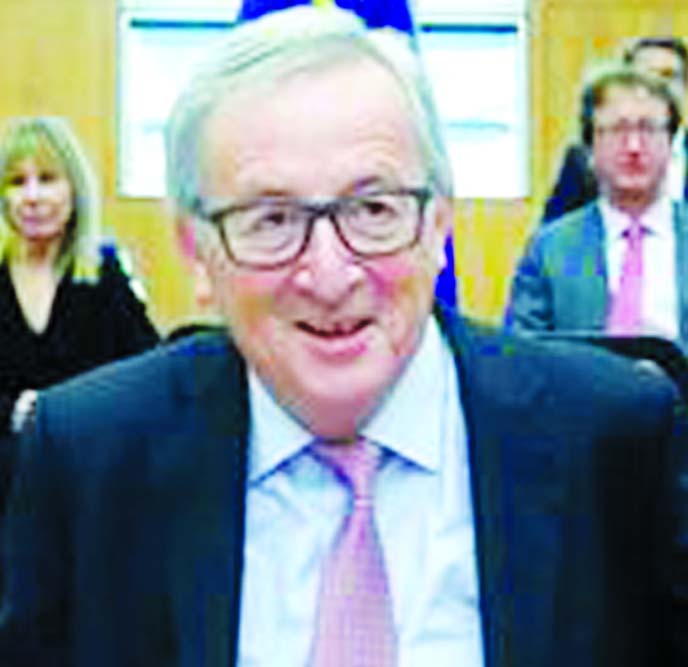
Reuters, Brussels :
European Union chief executive Jean-Claude Juncker on Wednesday presented options for reforming the bloc to shore up its unity and popular support after Britain’s shock decision to withdraw.
Five scenarios in a “white paper” that the president of the European Commission delivered to the European Parliament ranged from changing little to scaling back to just policing a common market to a major leap forward in pooling states’ sovereignty.
Juncker dismissed a much reduced role for the EU, saying the Union should have greater ambitions to build on 60 years of promoting peace and prosperity. Leaders of the 27 states other than Britain will discuss the White Paper when they celebrate the bloc’s 60th anniversary at Rome on March 25.
Juncker has spoken positively in recent days of one scenario under which some states would integrate further faster-a possibility some governments, especially in the poorer east, fear could entrench divisions to their disadvantage.
But overall he rejected criticism from some EU lawmakers that the executive was failing in its leadership role in the Union by not spelling out one single set of recommendations.
“I do not operate by executive orders,” Juncker said in a clear dig at U.S. President Donald Trump and his controversial policy directives in recent weeks. “I am not a dictator.”
But this would not mean the end of a “political Commission”, he told reporters, reiterating support for his presidency’s motto that implies a more assertive EU executive but that critics say overstep Brussels’ powers.
More broadly, the former Luxembourg premier said, it was national governments and parliaments which should work on the decisions to reform the EU which, as seen in Britain’s Brexit vote, faces mounting challenges from nationalist eurosceptics.
“The future of Europe should not be hostage to elections, party politics or cries of triumph directed at domestic audiences,” he said, repeating a familiar complaint that national leaders have tried to conceal their own responsibility for unpopular policies and failures behind “Brussels bashing”.
European Union chief executive Jean-Claude Juncker on Wednesday presented options for reforming the bloc to shore up its unity and popular support after Britain’s shock decision to withdraw.
Five scenarios in a “white paper” that the president of the European Commission delivered to the European Parliament ranged from changing little to scaling back to just policing a common market to a major leap forward in pooling states’ sovereignty.
Juncker dismissed a much reduced role for the EU, saying the Union should have greater ambitions to build on 60 years of promoting peace and prosperity. Leaders of the 27 states other than Britain will discuss the White Paper when they celebrate the bloc’s 60th anniversary at Rome on March 25.
Juncker has spoken positively in recent days of one scenario under which some states would integrate further faster-a possibility some governments, especially in the poorer east, fear could entrench divisions to their disadvantage.
But overall he rejected criticism from some EU lawmakers that the executive was failing in its leadership role in the Union by not spelling out one single set of recommendations.
“I do not operate by executive orders,” Juncker said in a clear dig at U.S. President Donald Trump and his controversial policy directives in recent weeks. “I am not a dictator.”
But this would not mean the end of a “political Commission”, he told reporters, reiterating support for his presidency’s motto that implies a more assertive EU executive but that critics say overstep Brussels’ powers.
More broadly, the former Luxembourg premier said, it was national governments and parliaments which should work on the decisions to reform the EU which, as seen in Britain’s Brexit vote, faces mounting challenges from nationalist eurosceptics.
“The future of Europe should not be hostage to elections, party politics or cries of triumph directed at domestic audiences,” he said, repeating a familiar complaint that national leaders have tried to conceal their own responsibility for unpopular policies and failures behind “Brussels bashing”.

